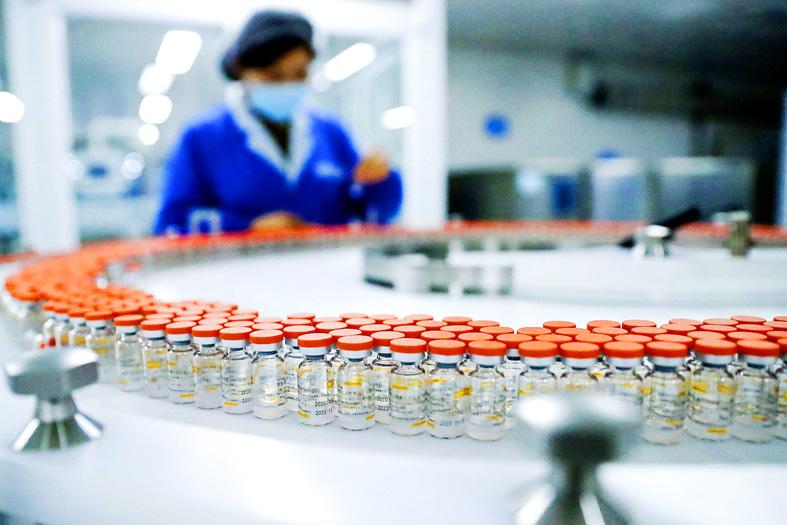Sixty-seven percent of Taiwanese would refuse a COVID-19 vaccine produced by a Chinese manufacturer, while 24.3 percent would accept it, a survey showed yesterday.
The poll, designed by the Taiwan International Strategic Study Society and the Taiwan International Studies Association, asked people about Taiwan-China relations and Taiwan-US relations under the administration of US President Joe Biden.
The results of the survey, conducted by Focus Survey Research, were announced at a news conference at the Howard Plaza Hotel in Taipei.

Photo: AP
It showed that only 5.4 percent of respondents “very much approved” if Taiwan were to import vaccines from China, while 18.9 percent “approved.”
Of the 67 percent who did not approve, 27.1 percent said they “mostly disapproved,” while 39.9 percent said they “very much disapproved,” it showed.
Asked whether they hoped Taiwan and China could resume meaningful dialogue, 77.9 percent said they did, while 13.7 percent said they did not, the survey showed.
“There is a contradiction in the results. The majority does not want Chinese vaccines, but a majority wants dialogue with China,” said Wang Kun-yi (王崑義), an associate professor at Tamkang University, who heads the Strategic Study Society.
This might be because China did not provide scientific data on its vaccines, he added.
Asked about their opinion on US’ assistance to Taiwan’s defense, only 21.3 percent said they felt that the US was sincere, while 61.1 percent said they felt that the US’ intention was to exploit Taiwan, the survey showed.
“Taiwan plays an important role in the framework of US-China competition. However, despite its efforts over the past two to three years, the US has not won the trust of Taiwanese,” society executive director Lo Ching-sheng (羅慶生) said, adding that Washington would need to work harder to improve its relationship with Taiwan.
Asked whether they believe that Biden could “rely on his political experience to help the US maintain its position as a major world power,” 60.9 percent said that they believed he could, while 17.8 percent said he could not, the study showed.
“This shows that Taiwanese look favorably upon Biden’s ability to lead,” Lo said.
Asked whether the administration of former US president Donald Trump had weakened the US, as it withdrew from major international organizations, 37.8 percent said that they believe the US to be weaker, while 41.6 percent said they did not, the study showed.
This showed that Taiwanese still have a high degree of confidence in the US government, Chinese Culture University College of Social Sciences dean Chao Chien-min (趙建民) said.
“In the past, the US observed a bottom line in its relationship with Taiwan, but now there are concerns that it has instrumentalized Taiwan, which is the core of the current US-China conflict,” he said.
Solving the issue of Taiwan’s sovereignty is not a core interest for the US, so there are concerns among Taiwanese that the US uses this issue — as well as issues related to Hong Kong — in talks with China to advance its own interests, he said.
The survey was conducted on Wednesday and Thursday, and collected 1,080 valid samples.
It had a margin of error of 2.98 percentage points.

US President Donald Trump yesterday announced sweeping "reciprocal tariffs" on US trading partners, including a 32 percent tax on goods from Taiwan that is set to take effect on Wednesday. At a Rose Garden event, Trump declared a 10 percent baseline tax on imports from all countries, with the White House saying it would take effect on Saturday. Countries with larger trade surpluses with the US would face higher duties beginning on Wednesday, including Taiwan (32 percent), China (34 percent), Japan (24 percent), South Korea (25 percent), Vietnam (46 percent) and Thailand (36 percent). Canada and Mexico, the two largest US trading

AIR SUPPORT: The Ministry of National Defense thanked the US for the delivery, adding that it was an indicator of the White House’s commitment to the Taiwan Relations Act Deputy Minister of National Defense Po Horng-huei (柏鴻輝) and Representative to the US Alexander Yui on Friday attended a delivery ceremony for the first of Taiwan’s long-awaited 66 F-16C/D Block 70 jets at a Lockheed Martin Corp factory in Greenville, South Carolina. “We are so proud to be the global home of the F-16 and to support Taiwan’s air defense capabilities,” US Representative William Timmons wrote on X, alongside a photograph of Taiwanese and US officials at the event. The F-16C/D Block 70 jets Taiwan ordered have the same capabilities as aircraft that had been upgraded to F-16Vs. The batch of Lockheed Martin

GRIDLOCK: The National Fire Agency’s Special Search and Rescue team is on standby to travel to the countries to help out with the rescue effort A powerful earthquake rocked Myanmar and neighboring Thailand yesterday, killing at least three people in Bangkok and burying dozens when a high-rise building under construction collapsed. Footage shared on social media from Myanmar’s second-largest city showed widespread destruction, raising fears that many were trapped under the rubble or killed. The magnitude 7.7 earthquake, with an epicenter near Mandalay in Myanmar, struck at midday and was followed by a strong magnitude 6.4 aftershock. The extent of death, injury and destruction — especially in Myanmar, which is embroiled in a civil war and where information is tightly controlled at the best of times —

China's military today said it began joint army, navy and rocket force exercises around Taiwan to "serve as a stern warning and powerful deterrent against Taiwanese independence," calling President William Lai (賴清德) a "parasite." The exercises come after Lai called Beijing a "foreign hostile force" last month. More than 10 Chinese military ships approached close to Taiwan's 24 nautical mile (44.4km) contiguous zone this morning and Taiwan sent its own warships to respond, two senior Taiwanese officials said. Taiwan has not yet detected any live fire by the Chinese military so far, one of the officials said. The drills took place after US Secretary